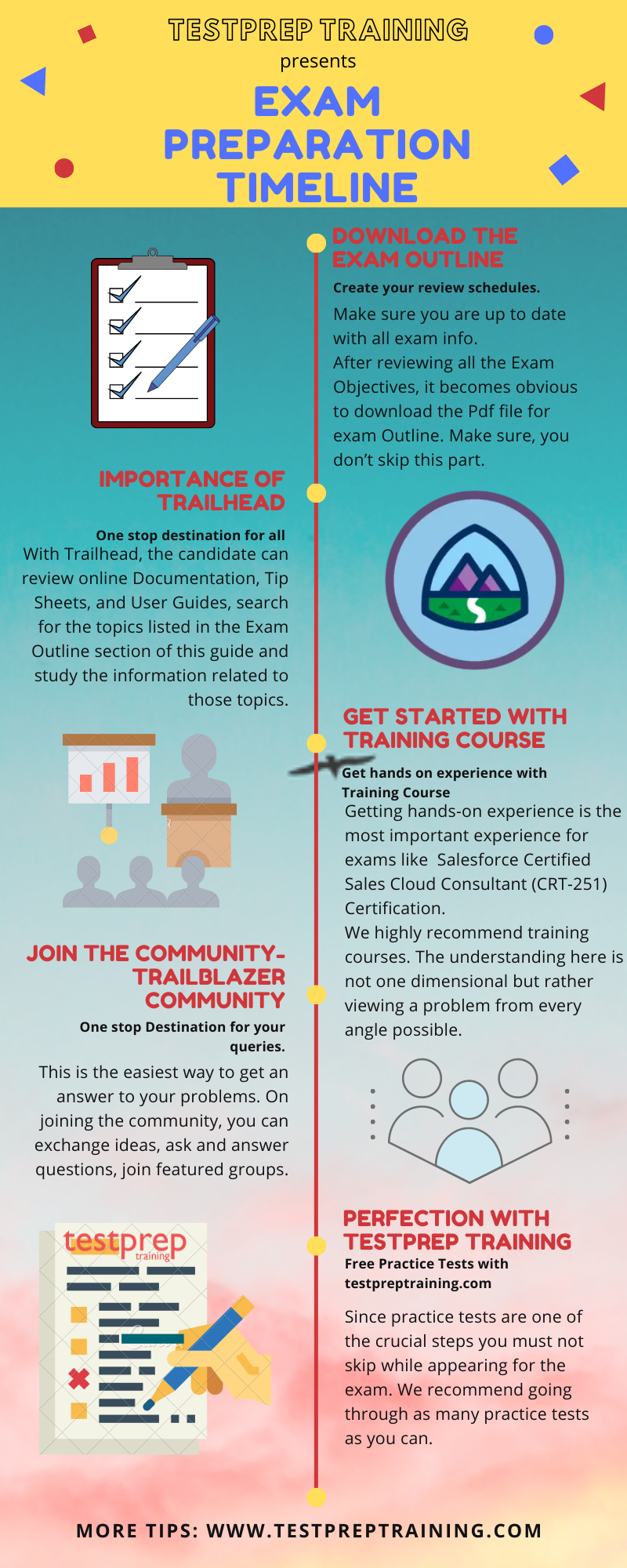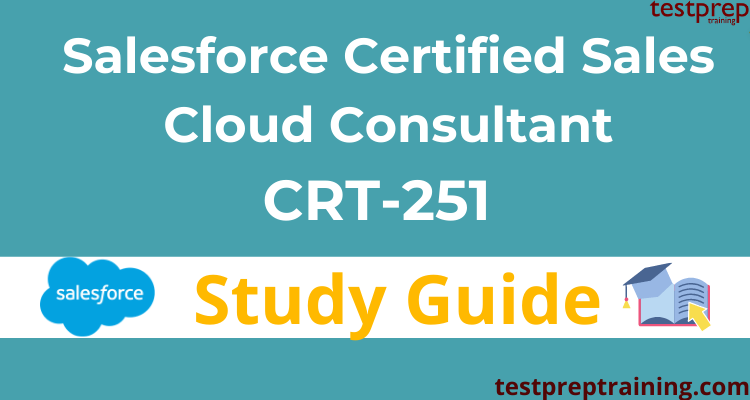CRT-251 is a Salesforce certification exam for Sales Cloud Consultants.It measures a consultant’s knowledge and skills in designing and implementing Salesforce Sales Cloud solutions for businesses.
The exam covers various topics, including designing Sales Cloud solutions, managing sales processes, implementing forecasting and pipeline management, managing products and price books, and integrating with other Salesforce solutions. It also covers best practices for sales teams and how to optimize sales performance using Sales Cloud.
CRT-251: Salesforce Sales Cloud Consultant: Glossary
- Account: In Salesforce, an account represents a customer or a prospect. It can be an individual, a company, or any other entity with whom the organization interacts.
- Campaign: A campaign refers to a marketing effort undertaken by organizations to promote their products or services, generate leads, and interact with customers. This encompasses a range of marketing activities, including email marketing, advertising, events, and social media marketing.
- Lead: A lead is a person or entity that has demonstrated an interest in an organization’s products or services but has not yet made a purchase or become a customer.
- Opportunity: An opportunity represents a potential sale that can be converted into revenue. It includes information such as the amount, stage, probability, and close date.
- Pipeline: A pipeline is a visual representation of the sales process that includes all the opportunities that a salesperson is currently working on.
- Forecast: A forecast is an estimate of the organization’s future sales revenue. It is based on the current opportunities in the pipeline, their probability of closure, and the expected close dates.
- Territory: A territory is a geographical region or a specific set of accounts that are assigned to a salesperson or a sales team.
- Quota: A quota is a target or a goal that is set for a salesperson or a sales team to achieve within a specific period.
- Account Plan: An account plan is a strategic plan that outlines how an organization plans to engage with a specific account to achieve its business objectives.
- Sales Process: A sales process is a series of steps that a salesperson follows to convert a lead into a customer. It includes activities such as prospecting, qualifying, presenting, and closing.
- Sales Stage: A sales stage represents a specific point in the sales process where the salesperson needs to complete certain activities to move the opportunity to the next stage.
- Sales Cycle: A sales cycle is the duration of time that it takes to convert a lead into a customer. It includes all the activities from the initial contact to the final sale.
- Sales Forecasting: Sales forecasting is the process of predicting future sales based on historical sales data, market trends, and other factors.
- Next, Sales Performance: Sales performance refers to the ability of a salesperson or a sales team to achieve their sales targets or quotas.
- Sales Analytics: Sales analytics involves examining sales data to uncover trends, patterns, and valuable insights that can assist organizations in enhancing their sales performance.
CRT-251: Salesforce Sales Cloud Consultant Exam Guide
Here are some resources and links that can help you prepare for the Salesforce Sales Cloud Consultant certification exam (CRT-251):
- Salesforce Certified Sales Cloud Consultant Exam Guide: This official guide provides an overview of the exam objectives and provides links to resources and study materials. You can find the guide here: https://trailhead.salesforce.com/credentials/salescloudconsultant
- Salesforce Trailhead: Salesforce Trailhead offers a variety of free online courses and modules that can help you prepare for the exam. You can access the Sales Cloud Consultant learning path here: https://trailhead.salesforce.com/en/content/learn/trails/sales-cloud-consultant
- Salesforce Help and Training: The Salesforce Help and Training portal provides access to documentation, tutorials, and other resources that can help you prepare for the exam. You can access the Sales Cloud Consultant resources here: https://help.salesforce.com/home/sales-cloud-consultant
- Focus on Force: Focus on Force offers a paid study guide and practice exams that can help you prepare for the CRT-251 exam. You can access the study guide and practice exams here: https://focusonforce.com/certifications/sales-cloud-consultant/
By using these resources and studying effectively, you can increase your chances of passing the Salesforce Sales Cloud Consultant certification exam (CRT-251). Good luck!
CRT-251: Salesforce Sales Cloud Consultant Exam Tips
Here are some tips for preparing and taking the Salesforce Sales Cloud Consultant exam:
- Understand the exam format: The Salesforce Sales Cloud Consultant exam consists of 60 multiple-choice questions that need to be answered in 105 minutes. It is a proctored, online exam that can be taken remotely or at a testing center.
- Review the exam guide: The Salesforce Sales Cloud Consultant exam guide provides a detailed outline of the exam topics and objectives. Going through the guide can provide you with insights into the exam’s coverage and the specific areas you should concentrate on.
- Study the key exam topics: The exam covers a range of topics such as sales process, forecasting, lead and opportunity management, account and contact management, and more. Make sure you understand these topics thoroughly and can apply them to real-life scenarios.
- Use Salesforce resources: Salesforce provides a wealth of resources for exam preparation, such as Trailhead modules, product documentation, and online training. Make sure you take advantage of these resources to deepen your understanding of Salesforce Sales Cloud.
- Practice with sample questions: Practice questions can help you familiarize yourself with the exam format and the types of questions you may encounter. Salesforce provides sample questions on its website, and you can also find practice tests from third-party providers.
- Join study groups or forums: Participating in study groups or online forums offers an excellent opportunity to exchange knowledge, seek clarification, and receive assistance from fellow Salesforce professionals who are also gearing up for the exam.
- Stay calm and focused during the exam: Make sure you take breaks when needed and stay calm and focused during the exam. Read the questions carefully, eliminate obviously incorrect answers, and choose the best possible answer based on your knowledge and experience.
Keep in mind that achieving success in the Salesforce Sales Cloud Consultant exam necessitates a blend of knowledge, readiness, and practical experience. By adhering to these suggestions, you can boost your chances of success and attain certification as a Salesforce Sales Cloud Consultant.
Study Guide: Salesforce CRT-251: Sales Cloud Consultant
The whole point of having a Study Guide is to direct in the right direction. Keeping that in mind, we assure you, this study guide will offer you with exactly what you need to qualify the exam. This will allow you to evaluate your readiness to successfully complete the Salesforce Certified Sales Cloud Consultant (CRT-251) exam. Also, this guide presents information about the recommended training and documentation, hands-on experience, training course completion, Trailhead trails, and self-study- all with the intent of helping you in your Salesforce Certified Sales Cloud Consultant Exam Preparation.

Step 1: Review the CRT-251 Exam Objectives
First and foremost before you begin with the preparation for the certification exam, make sure you are up to date with all exam info. Hence, you should viist the Official website of Salesforce and view and all the exam objectives. The Course Outline holds utmost importance in the exam as it essentially serves as the exam’s syllabus, with all the questions stemming from this specific domain list. Therefore, it’s good to have a thorough understanding of the exam domains before embarking on your preparation journey. This exam encompasses the following domains:
1. Sales Lifecycle: 23%
- Given business requirements, metrics, key performance indicators (KPIs), or business challenges, determine the optimal solution in Sales Cloud.
- Given a scenario, discuss common sales and marketing processes and anticipate key implementation considerations.
- Understand when to use Sales Cloud features and related products such as Sales Engagement, Salesforce Inbox, Enterprise Territory Management, Opportunity Forecasting, Sales Cloud Einstein, and generative/predictive artificial intelligence (AI).
- Transform business objectives and sales KPIs into reports and dashboards.
2. Implementation Strategies: 15%
- Prior to an implementation, assess user experience, the communication plan, training, and change management, and establish metrics that measure success.
- During an implementation, outline and apply appropriate deployment considerations.
- Post implementation, determine how to respond to low adoption and changing business requirements and user access, and plan for continuous improvement.
3. Practical Application of Sales Cloud Expertise: 33%
- Given a set of requirements, construct an end-to-end sales process within Salesforce that supports the business from Lead to Opportunity to Quote to Close.
- Given a scenario, determine when it’s appropriate to extend declarative development with custom development, third-party applications, or Salesforce products.Analyze use cases and considerations for using productivity tools, such as email integrations, Slack, Salesforce Mobile, and third-party integrations.
- Given a set of business requirements, identify the appropriate security model (sharing rules, role hierarchy, Account Teams, Opportunity Teams).
- Outline the capabilities, use cases, and design considerations when implementing Opportunity Products, Products, Price Books, Quotes, and the possible impact of multi-currency.
- Explain how Campaign capabilities support the sales process.Given a set of requirements, determine how to support different business process scenarios for Leads and Opportunities.
4. Consulting Practices: 14%
- Leverage the project management lifecycle to deliver a successful solution on time and within budget.
- Given a scenario, determine how to facilitate a successful consulting engagement.
- Conduct discovery workshops, analyze business requirements, define solutions, and prioritize use cases.
5. Data Management: 15%
- Explain the use cases and considerations for data migrations and integrations.
- Given a scenario, outline the scalability implications of a solution.
- Discuss approaches for managing sales data quality in Salesforce.
Step 2: Salesforce Certified Sales Cloud Consultant Trailhead
If you are someone who has already qualified and attained credentials with Salesforce, then you might know the importance of Trailhead. On the other hand, if you are a newbie, then let’s put it out there. Trailhead is a pivotal component of your Salesforce preparation guide. Through Trailhead, candidates can access online Documentation, Tip Sheets, User Guides, and search for topics outlined in the Exam Outline section of this guide, enabling them to study the relevant information related to those topics.
Step 3: Get started with Training Course
Getting hands-on experience is the most important experience for exams like Salesforce Certified Sales Cloud Consultant (CRT-251) Certification. And, the only way you can achieve is through Training Course. You can easily get acquainted with training courses for the same. Nonetheless, Salesforce offers the candidate with quite a few options to choose from. So, head to their website, if you want to master your skills. We highly recommend training courses.
Step 4: Join the Community- Trailblazer Community
You know sometimes, we’re stuck with some problem or the other. Well, we all are humans, so that an obvious fact. However, what if you’re stuck somewhere with your preparation and need an answer from some expert oo any adviser. Don’t know what to do then?
Take it from us, join a community, and in this case join Trailblazer Community. You’ll thank us later, but this is the easiest way to get an answer to your problems. On joining the community, the prospects of getting resolutions to an issue increase steeply as greater number of people are involved. Also, multiple viewpoints make the stuff more dynamic. These discussions make the studies more comprehensive.
Step 5: Evaluate yourself with Practice Tests
Evaluating your preparations is a crucial phase in your journey, which can be achieved through self-assessment of your performance. Taking the Salesforce Certified Sales Cloud Consultant Practice Exam is essential for gauging your knowledge and pinpointing areas that need enhancement. Strengthening your weaker domains is pivotal to your exam success. Additionally, these tests acquaint you with the actual exam setting, allowing you to refine your accuracy and speed. Furthermore, attempting multiple practice tests bolsters your confidence, pushing you to outperform your previous attempts. Lets start practising now!



